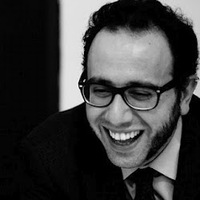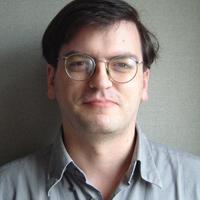
Giuseppe Primiero
I am an Associate Professor of Logic in the Department of Philosophy at the State University of Milan (Italy)
Previously, I was Senior Lecturer in the Foundations of Computing Research Group, School of Science and Technology, Department of Computer Science, Middlesex University London. I also held positions as Post-Doctoral Fellow of the Flemish Research Foundation at the Centre for Logic and Philosophy of Science at Ghent University, Belgium, and at the Faculty of Philosophy, Leiden University, the Netherlands.
I own a PhD in Philosophy from the University of Palermo (Italy) and a MA in Philosophy from the University of Leiden (the Netherlands). I am also qualified in the Research Area of Science and Technologies of Information by CNR (National Research Council - Italy).
My work and research is about the Philosophy of Computing and Information, Computational and Epistemic Logics, Type Theories and Procedural Semantics.
Some Associations and Groups I am involved with:
CiE - Computability in Europe (Secretary General)
HaPoC - History and Philosophy of Computing (Vice-President)
ACM- Association for Computing Machinery
IACAP - The International Association of Computing and Philosophy (Member at Large)
The Society for the Philosophy of Information
The Association for Symbolic Logic
AILA – Associazione Italiana di Logica e sue Applicazioni
Address: Via Festa del Perdono 7, 20122 Milano (Italy)
Previously, I was Senior Lecturer in the Foundations of Computing Research Group, School of Science and Technology, Department of Computer Science, Middlesex University London. I also held positions as Post-Doctoral Fellow of the Flemish Research Foundation at the Centre for Logic and Philosophy of Science at Ghent University, Belgium, and at the Faculty of Philosophy, Leiden University, the Netherlands.
I own a PhD in Philosophy from the University of Palermo (Italy) and a MA in Philosophy from the University of Leiden (the Netherlands). I am also qualified in the Research Area of Science and Technologies of Information by CNR (National Research Council - Italy).
My work and research is about the Philosophy of Computing and Information, Computational and Epistemic Logics, Type Theories and Procedural Semantics.
Some Associations and Groups I am involved with:
CiE - Computability in Europe (Secretary General)
HaPoC - History and Philosophy of Computing (Vice-President)
ACM- Association for Computing Machinery
IACAP - The International Association of Computing and Philosophy (Member at Large)
The Society for the Philosophy of Information
The Association for Symbolic Logic
AILA – Associazione Italiana di Logica e sue Applicazioni
Address: Via Festa del Perdono 7, 20122 Milano (Italy)
less
Related Authors
Daniele de Rigo
Joint Research Centre
Sebastian J Juchnowski
University of Wroclaw
Daniel Wójcik
Nencki Institute of Experimental Biology
Georg Pflug
University of Vienna
Raimund Kovacevic
Tu Wien
InterestsView All (49)





Uploads
Papers by Giuseppe Primiero
processes, posed by transitively trusted dependencies between
packages from distinct repositories. To analyse them, we present SecureNDC, a Coq implemented calculus using an explicit trust function to bridge repository access and software package installation rights. Thereby, we resolve a version of the minimum install problem under trust conditions on repositories.
the propositions as truth-bearers tradition on the one hand, and from the assertoric standpoint on truth for propositions by proof-objects. A further step in the evolution of the notion of logical validity is represented by formulation of correctness on computational processes, as suggested by the proofs-as-programs interpretation. We analyse this fairly recent computational interpretation of logic in view of the new principles it offers to characterize the notion of validity: execution conditions; resources accessibility; local validity; error-handling. In this new and extended sense, logical validity significantly improves the simple assertoric interpretation of correctness of non-realistic philosophies of logic. We set explicitly the connection to the notion of eventual consistency that holds for computational systems in a distributed setting.
processes, posed by transitively trusted dependencies between
packages from distinct repositories. To analyse them, we present SecureNDC, a Coq implemented calculus using an explicit trust function to bridge repository access and software package installation rights. Thereby, we resolve a version of the minimum install problem under trust conditions on repositories.
the propositions as truth-bearers tradition on the one hand, and from the assertoric standpoint on truth for propositions by proof-objects. A further step in the evolution of the notion of logical validity is represented by formulation of correctness on computational processes, as suggested by the proofs-as-programs interpretation. We analyse this fairly recent computational interpretation of logic in view of the new principles it offers to characterize the notion of validity: execution conditions; resources accessibility; local validity; error-handling. In this new and extended sense, logical validity significantly improves the simple assertoric interpretation of correctness of non-realistic philosophies of logic. We set explicitly the connection to the notion of eventual consistency that holds for computational systems in a distributed setting.
• some basic algebraic auxiliary structures
• a detailed description of the basic notions and techniques from fuzzy set theory :
• fuzzy set-theoretic operations, fuzzy relational structures, calculus of fuzzy quantities,
• calculus of linguistic variables
• a glimpse on alternative models for modelling imprecise and uncertain information :
• rough set theory, flou set theory, L-fuzzy set theory, intuitionistic fuzzy set theory
• formal languages
• Turing machines
• computability
• classical logic, semantics, soundness, completeness and compactness
• decidability, positive test
• Löwenheim-Skolem theorem
• representability, incompleteness (Gödel), indefinabilty
• provability predicates, consistency proofs
• notions of non-standard models, second order arithmetic and inconsistent arithmetic
The constructive philosophy of logic represent a good starting point to analyze the notion of error: 1) it strongly relies on a principle of rightness; 2) given the ground isomorphism between proofs and programs, it can provide a common ground for the formal treatment of the notion of error in both human and mechanical systems.
Tasks:
1. A formal treatment and taxonomy of errors for constructive semantics to provide fundamental theoretical advancements in the representation of collective rationality.
2. Errors' reduction processes will be treated in the setting of consensus reaching and distrust-based relations, to analyze the conditions in which (human/artificial) networks present and resolve conflicting assignments of tasks.
3. A full philosophical and formal study will be developed of the specific conditions in which networks incur in error-states, in particular referring to phenomena of distrust, mistrust, doubt and risk.
1. to define a notion of knowledge on the basis of relevant information;
2. to use modalities to formalize the agents' epistemic attitudes;
3. to design a multi-source and multi-receiver language for individually acceptedand distributed knowledge.
I focus on information exchange and knowledge assertions within a constructive modal language. The multi-source and multi-receiver language includes 1) a notion of trust, to relate agents in the same communication group, and 2) a notion of priority, to model relations of reliable knowledge exchange. Applications of such a model are:
● the verification and nature of programs in distributed systems;
● the definition of knowledge in the context of information retrieval based processes;
● the formal semantics of modifiers in natural language.
The global aim of this project is to elaborate a formal methodology for central problem fields from philosophy of science: inductive generalization, abduction, scientific explanation, causality, discovery, functional analysis and theory-dynamics. The ultimate goal is that by means of (corrective, ampliative and combined) adaptive logics the methodology would enable one to generate, on the basis of the specific properties of a problem as it appeared in its historical context, a formal problem-solving process that forms an explication for the historical process as it actually took place.